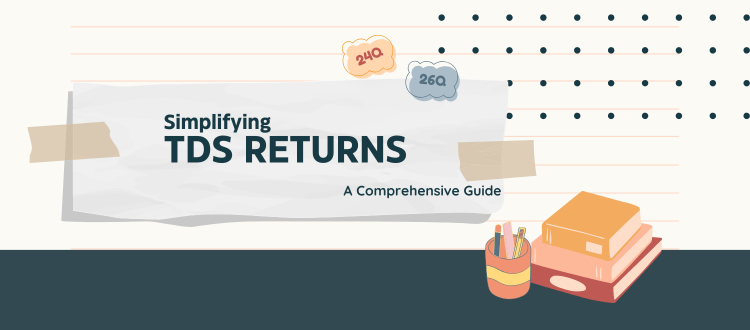
19 Jan Simplifying TDS Returns: A Comprehensive Guide for Businesses and Professionals
Tax Deducted at Source (TDS) is a crucial component of India’s taxation framework, ensuring taxes are collected at the point of income generation. For businesses and employers, timely and accurate filing of TDS returns is a legal obligation that cannot be ignored. Let’s dive into the essentials of TDS returns, including the forms, deadlines, and consequences of non-compliance, with a focus on simplifying the process.
What Are TDS Returns?
TDS returns are quarterly statements submitted to the Income Tax Department, detailing the tax deducted at source (TDS) on payments made by an entity. These filings include critical information such as:
- Details of tax deducted at source.
- PAN details of deductees (the individuals or entities from whom tax is deducted).
- Payment information, including the TDS amount deposited with the government.
These returns are essential for ensuring transparency and compliance, as they allow the government to track tax collections and credit the deducted tax to the respective deductee’s account.
Types of TDS Return Forms

1. Form 24Q:
This is a form used for reporting TDS deducted on salaries. Tax on Salaries is usually deducted by the employer after considering the salary breakup, exemptions, and deductions claimed under sections like 80C, 80D, etc. The same is then reported in this form.
2. Form 26Q:
This form is used for reporting TDS on non-salary payments such as interest, rent, contract payments, professional fees, and commissions. It includes payment type, deductee’s PAN, and the amount paid.
3. Form 27Q:
This form is used to report TDS on payments made to non-residents, such as royalties, interest, and technical service fees. It reflects the details of the non-resident’s country, TDS rate as per applicable treaties, and payment nature.
4. Form 27EQ:
This form is used for reporting Tax Collected at Source (TCS) on specific goods or services like alcohol, tobacco, scrap, or the sale of motor vehicles above ₹10 lakh. It Includes the details of the buyer, the nature of goods or services sold, and the TCS rate.
How to File TDS Returns: Step-by-Step Process
1. Deduct TDS: Calculate and deduct TDS from payments such as salaries, rent, or interest based on applicable rates and the deductee’s category (resident or non-resident).
2. Deposit TDS: Deposit the deducted TDS with the Income Tax Department using the income tax portal. This must be done by the 7th of the following month.
3. Choose Form & Prepare Returns: Choose the relevant form form the ones given above and compile the necessary details, including the deductor’s name, TAN, deductee’s PAN, payment amounts, TDS deducted, and challan details (BSR code, serial number, and payment date).
4. File Returns Electronically: Register on the TRACES portal, prepare the return using TDS software, validate it with the File Validation Utility (FVU), and upload it on the TRACES platform.
5. Generate and Share TDS Certificates: Download Form 16 for salary payments and Form 16A for other payments from TRACES and distribute them to deductees.
Deadlines for TDS Return Filing
Timely filing of TDS returns is crucial to avoid penalties. Here’s a quick overview of the deadlines for each quarter:
Q1 (April to June): 31st July
Q2 (July to September): 31st October
Q3 (October to December): 31st January
Q4 (January to March): 31st May
Why Accurate and Timely Filing Matters
Filing your TDS returns accurately and on time ensures:
- Avoidance of Penalties: Late filing attracts a penalty of ₹200 per day, up to the total TDS amount and failure to file or rectify errors can lead to a penalty under Section 271H, ranging from ₹10,000 to ₹1,00,000.
- Smooth Tax Credit for Deductees: Errors in TDS returns can delay the deductee’s ability to claim tax credits, causing potential disputes.
- Compliance During Audits: Inaccurate filings or non-compliance can lead to the disallowance of expenses, inflating the taxable income of the deductor.
How can we Help?
At Fiscora Solutions, we take the stress out of navigating TDS compliance by offering comprehensive, tailored services to meet your needs.
From accurate TDS calculations based on applicable rates to seamless end-to-end filing support, we ensure every step is handled with precision. Our expertise extends to rectifying errors and discrepancies in previous filings, ensuring your records remain flawless.
Additionally, we provide advisory services to keep you updated on the latest TDS regulations, empowering you to stay compliant effortlessly. Compliance doesn’t have to be complicated—partner with us to focus on growing your business while we manage the numbers.
Reach out today for hassle-free TDS management!




No Comments